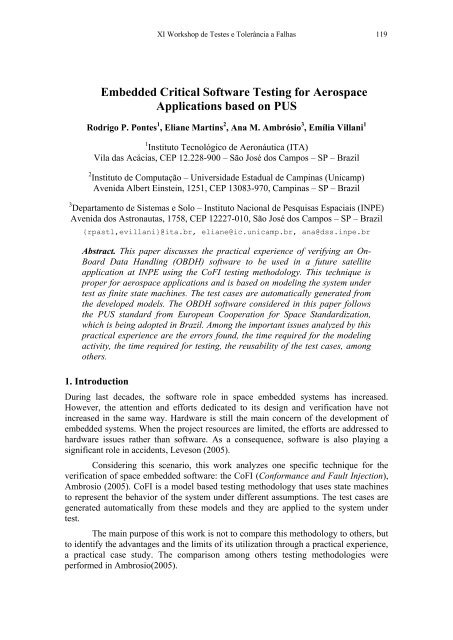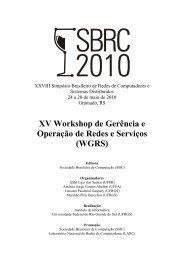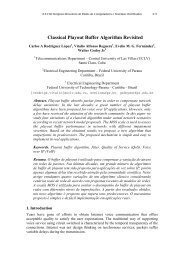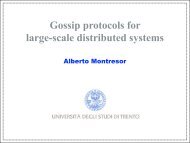XI Workshop de Testes e Tolerância a Falhas (WTF) - SBRC 2010
XI Workshop de Testes e Tolerância a Falhas (WTF) - SBRC 2010
XI Workshop de Testes e Tolerância a Falhas (WTF) - SBRC 2010
Create successful ePaper yourself
Turn your PDF publications into a flip-book with our unique Google optimized e-Paper software.
<strong>XI</strong> <strong>Workshop</strong> <strong>de</strong> <strong>Testes</strong> e Tolerância a <strong>Falhas</strong> 119<br />
Embed<strong>de</strong>d Critical Software Testing for Aerospace<br />
Applications based on PUS<br />
Rodrigo P. Pontes 1 , Eliane Martins 2 , Ana M. Ambrósio 3 , Emília Villani 1<br />
1 Instituto Tecnológico <strong>de</strong> Aeronáutica (ITA)<br />
Vila das Acácias, CEP 12.228-900 – São José dos Campos – SP – Brazil<br />
2 Instituto <strong>de</strong> Computação – Universida<strong>de</strong> Estadual <strong>de</strong> Campinas (Unicamp)<br />
Avenida Albert Einstein, 1251, CEP 13083-970, Campinas – SP – Brazil<br />
3 Departamento <strong>de</strong> Sistemas e Solo – Instituto Nacional <strong>de</strong> Pesquisas Espaciais (INPE)<br />
Avenida dos Astronautas, 1758, CEP 12227-010, São José dos Campos – SP – Brazil<br />
{rpastl,evillani}@ita.br, eliane@ic.unicamp.br, ana@dss.inpe.br<br />
Abstract. This paper discusses the practical experience of verifying an On-<br />
Board Data Handling (OBDH) software to be used in a future satellite<br />
application at INPE using the CoFI testing methodology. This technique is<br />
proper for aerospace applications and is based on mo<strong>de</strong>ling the system un<strong>de</strong>r<br />
test as finite state machines. The test cases are automatically generated from<br />
the <strong>de</strong>veloped mo<strong>de</strong>ls. The OBDH software consi<strong>de</strong>red in this paper follows<br />
the PUS standard from European Cooperation for Space Standardization,<br />
which is being adopted in Brazil. Among the important issues analyzed by this<br />
practical experience are the errors found, the time required for the mo<strong>de</strong>ling<br />
activity, the time required for testing, the reusability of the test cases, among<br />
others.<br />
1. Introduction<br />
During last <strong>de</strong>ca<strong>de</strong>s, the software role in space embed<strong>de</strong>d systems has increased.<br />
However, the attention and efforts <strong>de</strong>dicated to its <strong>de</strong>sign and verification have not<br />
increased in the same way. Hardware is still the main concern of the <strong>de</strong>velopment of<br />
embed<strong>de</strong>d systems. When the project resources are limited, the efforts are addressed to<br />
hardware issues rather than software. As a consequence, software is also playing a<br />
significant role in acci<strong>de</strong>nts, Leveson (2005).<br />
Consi<strong>de</strong>ring this scenario, this work analyzes one specific technique for the<br />
verification of space embed<strong>de</strong>d software: the CoFI (Conformance and Fault Injection),<br />
Ambrosio (2005). CoFI is a mo<strong>de</strong>l based testing methodology that uses state machines<br />
to represent the behavior of the system un<strong>de</strong>r different assumptions. The test cases are<br />
generated automatically from these mo<strong>de</strong>ls and they are applied to the system un<strong>de</strong>r<br />
test.<br />
The main purpose of this work is not to compare this methodology to others, but<br />
to i<strong>de</strong>ntify the advantages and the limits of its utilization through a practical experience,<br />
a practical case study. The comparison among others testing methodologies were<br />
performed in Ambrosio(2005).







